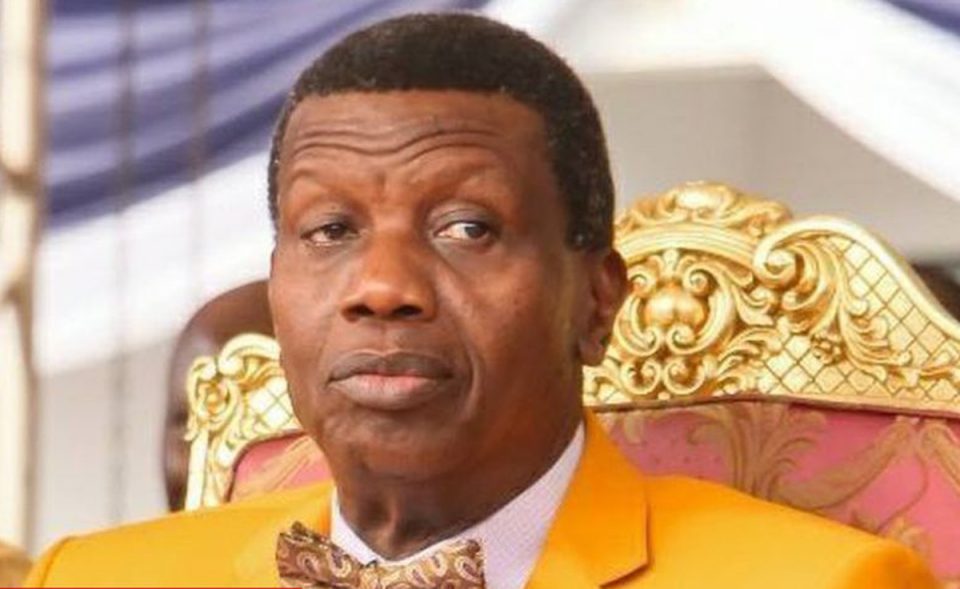Pastor Enoch Adeboye, General Overseer of the Redeemed Christian Church of God (RCCG) is not given to frivolities. Therefore, he should be taken seriously when he added his voice to those alleging that about 80 per cent of the country’s oil is being stolen and that 90 per cent of revenues from the balance of 20 per cent is used to service the country’s debt. Adeboye made his views known in his message at the church’s monthly thanksgiving service held at the Throne of Grace, Surulere, Lagos, on April 3.
Pastor Adeboye said his message was in reaction to the criticisms against the church’s creation of a Politics Directorate as well as its instruction to its members to get actively involved in politics, preparatory to the 2023 general elections.
According to the revered cleric, “It is in the news and nobody has denied it that as of now, more than 80 percent of the total oil we are producing is being stolen. It came from the government.
“That leads me to several questions, (1) Who is the one stealing the oil (2) Where is the money going to? I mean, 80 percent of what should have been the income of a nation is going into the hands of some people, that is a lot of money (3) What do they want to do with the money? (4) Who are the foreign nations buying this stolen oil? (5) How many of these nations of the world are your friends?”
These are quite germane questions but they are likely to end up as rhetorical questions, characteristic of the Buhari administration.
Crude oil was discovered in Oloibiri, Niger Delta, in 1956. In which case we should have gone far in understanding how things work in the energy sector if we were a serious country. Unfortunately, we keep complaining of rudimentary things which we do not hear of in other oil-producing countries. Where we are not whining over pipeline vandalisation, we are perpetually complaining about illegal bunkering. Ours is probably the only crude oil producer that also imports fuel.
The question of who the oil thieves are is also pertinent. A former head of state was once reported to have said if terrorism festers over a long period, then we should begin to look in the direction of the incumbent government. Likewise, stealing of oil is not a job for minions; it is the high and mighty that are behind such illegality. That explains why the government has not been able to rein in the practice. Even if arrests are made, we hardly hear updates as the cases are usually buried because of the caliber of those behind the suspects.
But it is incredible that such massive scale of stealing of an essential national asset has been going on for years, even under a government that rode into power on the change mantra and as an anti-corruption crusader. As Pastor Adeboye wondered, if 80 per cent of what is supposed to go into the country’s coffers ends up in private pockets, it means a paltry 20 per cent is what eventually accrues to the nation. Even then, 90 per cent of this goes into debt servicing. This explains, at least in part, the infrastructural deficit we suffer. To worsen matters, the country is unable to meet its quota of crude production stipulated by the Organisation of Petroleum Exporting Countries (OPEC).
The prognosis is scary, indeed.
With Nigeria borrowing as if borrowing is going out of fashion, the country is treading on the path of bankruptcy, in which case we would end up bequeathing to our children and the coming generations a lot of debt.
Adeboye asked us to pray that “…the Almighty God will expose those stealing our oil. That God will have mercy on our nation, and that He should help us deal with our debt.”
Much as we agree that the nation needs prayers, the question of asking God to expose those behind the crude theft is something within the reach of the government. While the clerics may focus on praying and fasting for the country, it is the responsibility of governments to think through problems or challenges. Nigeria is not the only country producing crude oil. But we don’t get to hear of the kind of devastating news from our energy sector elsewhere. So, how are they doing it? This is what should concern those in charge of the sector in the country. They attend international conferences and other engagements on the sector abroad. If they, and by extension, the Federal Government are truly desirous of putting an end to crude theft, it would be a thing of the past in a matter of months, if not weeks.
In this wise, the Nigerian National Petroleum Company Limited (NNPC) has its job cut out for it. It must strengthen its collaboration with the Joint Security Task Force and other stakeholders. It must also be ready to deploy technology to check the trend. Moreover, those who want to do business in the upstream sector should contact the regulatory authorities for guidance and the necessary permits.
Above all, it is the government’s political will that matters most in checking the activities of the crude thieves. The government must halt this hemorrhage and national embarrassment.




